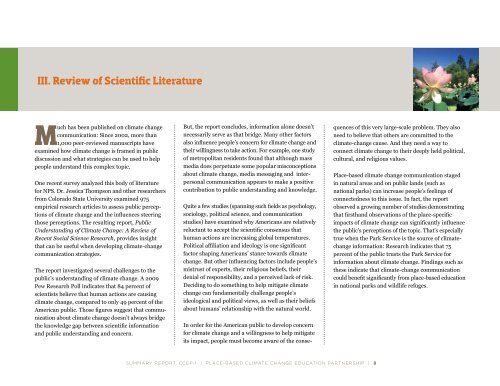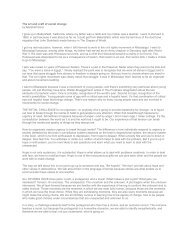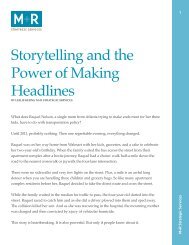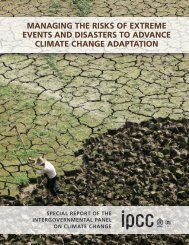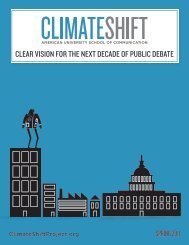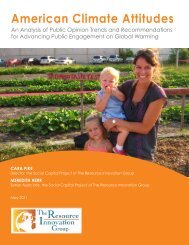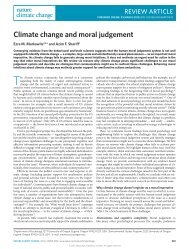Place-based Climate Change Education Partnership Report.pdf
Place-based Climate Change Education Partnership Report.pdf
Place-based Climate Change Education Partnership Report.pdf
Create successful ePaper yourself
Turn your PDF publications into a flip-book with our unique Google optimized e-Paper software.
III. Review of Scientific Literature<br />
Much has been published on climate change<br />
communication: Since 2002, more than<br />
1,000 peer-reviewed manuscripts have<br />
examined how climate change is framed in public<br />
discussion and what strategies can be used to help<br />
people understand this complex topic.<br />
One recent survey analyzed this body of literature<br />
for NPS. Dr. Jessica Thompson and other researchers<br />
from Colorado State University examined 975<br />
empirical research articles to assess public perceptions<br />
of climate change and the influences steering<br />
those perceptions. The resulting report, Public<br />
Understanding of <strong>Climate</strong> <strong>Change</strong>: A Review of<br />
Recent Social Science Research, provides insight<br />
that can be useful when developing climate-change<br />
communication strategies.<br />
The report investigated several challenges to the<br />
public’s understanding of climate change. A 2009<br />
Pew Research Poll indicates that 84 percent of<br />
scientists believe that human actions are causing<br />
climate change, compared to only 49 percent of the<br />
American public. Those figures suggest that communication<br />
about climate change doesn’t always bridge<br />
the knowledge gap between scientific information<br />
and public understanding and concern.<br />
But, the report concludes, information alone doesn’t<br />
necessarily serve as that bridge. Many other factors<br />
also influence people’s concern for climate change and<br />
their willingness to take action. For example, one study<br />
of metropolitan residents found that although mass<br />
media does perpetuate some popular misconceptions<br />
about climate change, media messaging and interpersonal<br />
communication appears to make a positive<br />
contribution to public understanding and knowledge.<br />
Quite a few studies (spanning such fields as psychology,<br />
sociology, political science, and communication<br />
studies) have examined why Americans are relatively<br />
reluctant to accept the scientific consensus that<br />
human actions are increasing global temperatures.<br />
Political affiliation and ideology is one significant<br />
factor shaping Americans’ stance towards climate<br />
change. But other influencing factors include people’s<br />
mistrust of experts, their religious beliefs, their<br />
denial of responsibility, and a perceived lack of risk.<br />
Deciding to do something to help mitigate climate<br />
change can fundamentally challenge people’s<br />
ideological and political views, as well as their beliefs<br />
about humans’ relationship with the natural world.<br />
In order for the American public to develop concern<br />
for climate change and a willingness to help mitigate<br />
its impact, people must become aware of the consequences<br />
of this very large-scale problem. They also<br />
need to believe that others are committed to the<br />
climate-change cause. And they need a way to<br />
connect climate change to their deeply held political,<br />
cultural, and religious values.<br />
<strong>Place</strong>-<strong>based</strong> climate change communication staged<br />
in natural areas and on public lands (such as<br />
national parks) can increase people’s feelings of<br />
connectedness to this issue. In fact, the report<br />
observed a growing number of studies demonstrating<br />
that firsthand observations of the place-specific<br />
impacts of climate change can significantly influence<br />
the public’s perceptions of the topic. That’s especially<br />
true when the Park Service is the source of climatechange<br />
information: Research indicates that 75<br />
percent of the public trusts the Park Service for<br />
information about climate change. Findings such as<br />
these indicate that climate-change communication<br />
could benefit significantly from place-<strong>based</strong> education<br />
in national parks and wildlife refuges.


